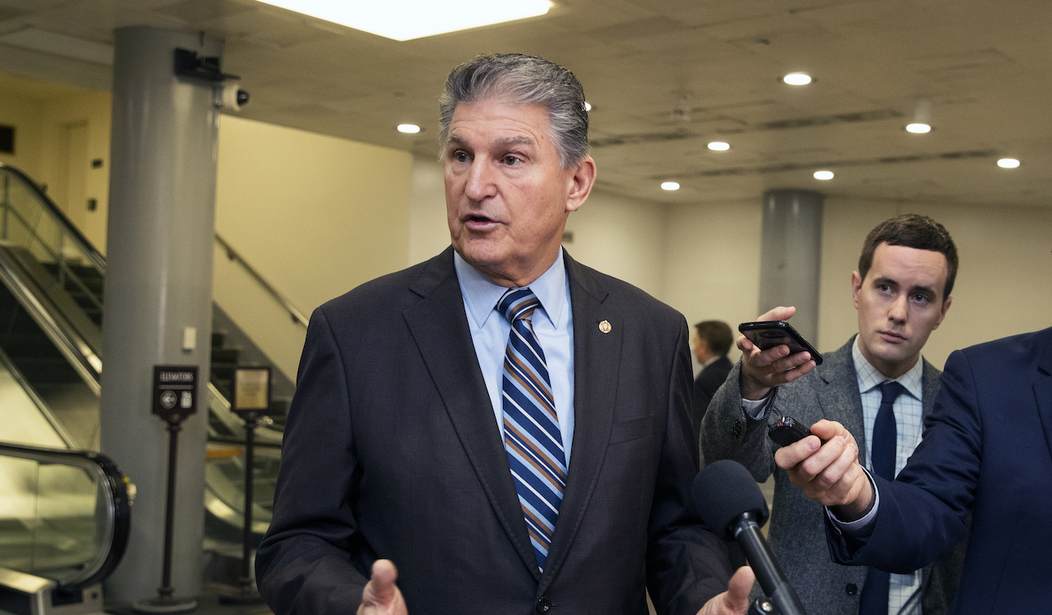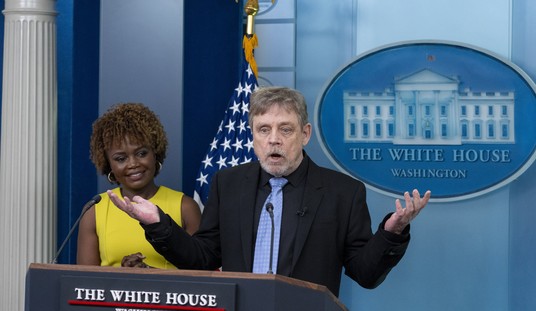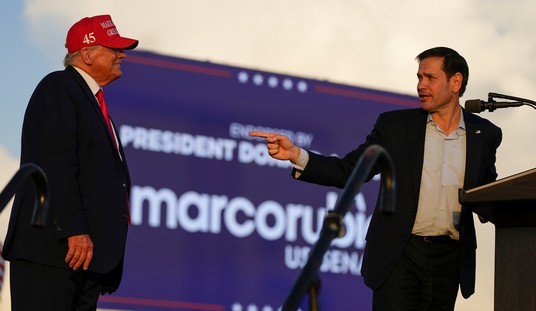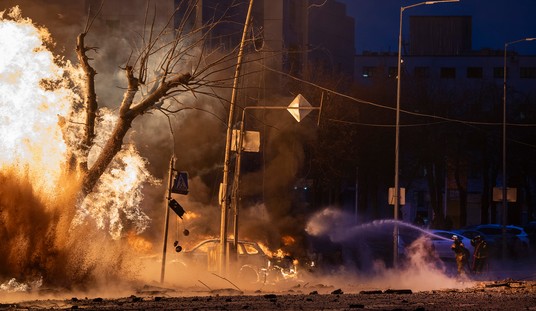It’s the second part of that headline that has lefties irate more so than the first. Until his new op-ed was published this morning Manchin hadn’t declared definitively that he’d vote no on H.R. 1, the Dems’ mammoth kitchen-sink voting-reform legislation — but he’d made lots of discouraging noises about it. Knowing that, liberals had already begun to shift towards considering what alternatives he might support. A narrower voting-rights bill, perhaps? If H.R. 1 was a nonstarter for him, what might he accept in lieu of it?
The good news for them is that he is open to a more targeted bill. The bad news is that he’s not going to make any new carve-outs to the filibuster in order to pass it by a simple majority vote. If we’re going to reform voting, he says in today’s op-ed, we need Republican buy-in.
Which means no bill will pass. There’s no universe in which 10 Senate Republicans support legislation that will liberalize voting in the aftermath of Trump’s “stop the steal” campaign. Voting reform is dead, as of today.
Democrats in Congress have proposed a sweeping election reform bill called the For the People Act. This more than 800-page bill has garnered zero Republican support. Why? Are the very Republican senators who voted to impeach Trump because of actions that led to an attack on our democracy unwilling to support actions to strengthen our democracy? Are these same senators, whom many in my party applauded for their courage, now threats to the very democracy we seek to protect?
The truth, I would argue, is that voting and election reform that is done in a partisan manner will all but ensure partisan divisions continue to deepen…
The Voting Rights Act, for example, was monumental in the fight to guarantee freer and fairer elections in the United States. Since its original passage, it has been reauthorized with overwhelming bipartisan votes five separate times. In addition, there is bipartisan support to pass the latest iteration of this legislation, the rightfully named John Lewis Voting Rights Advancement Act.
The John Lewis Voting Rights Advancement Act would update the formula states and localities must use to ensure proposed voting laws do not restrict the rights of any particular group or population. My Republican colleague, Sen. Lisa Murkowski, has joined me in urging Senate leadership to update and pass this bill through regular order.
That’s nice that he has Murkowski on board with the John Lewis bill but he needs nine more Republicans to beat a filibuster. Let’s say he gets all seven who voted to convict Trump (Murkowski was one of those seven) plus Rob Portman, who’s retiring and who voted in favor of the January 6 commission. That’s eight. Who are the other two? Maybe Roy Blunt, who’s also retiring, would consider it. But that’s still one short. Who’s the tenth, and decisive, vote?
Which GOP incumbent wants to risk infuriating a Republican base that’s been convinced by Trump that he lost in November only because states made it easier to vote during the pandemic, enabling some sort of still unexplained fraud on a massive scale?
Even Liz Cheney, one of the few Republicans in Congress willing to challenge Trump on his election claims, recently defended the new voting laws being passed by Republican state legislatures. Those laws were driven by the paranoia Trump stoked about cheating; GOP officials had to show their voters that they were taking some sort of action to address “election integrity.” But despite her antipathy to Trump and “stop the steal,” Cheney declined to oppose the new laws. As a Twitter pal said to me this morning, that shows that Republican opposition to making voting easier runs deeper than support for Trump does.
If Dems couldn’t get Cheney to support H.R. 1 after she voted to impeach, what makes Manchin think the seven Senate Republicans who voted to convict will support any voting-rights bill?
Liberals on Twitter aren’t taking the Manchin news well:
So let me get this straight: Sen. Manchin claims to want to protect voting rights, but wants to empower Senate Republicans who are hellbent on restricting voting rights?
— Robert Reich (@RBReich) June 6, 2021
Never been this disappointed in a politician before. Joe Manchin is voting against the right to vote. His real reason can only be if we elect more Dems he will lose personal power and leverage he has now. Like so many before him, power has stolen his heart.
— Joe Lockhart (@joelockhart) June 6, 2021
Manchin calling efforts to protect the right to vote “partisan voting legislation” while de facto embracing GOP voter suppression laws is one of the most offensives uses of political language I’ve ever seen.
— Ben Rhodes (@brhodes) June 6, 2021
Manchin’s op-ed might as well be titled, “Why I’ll vote to preserve Jim Crow.” https://t.co/pS1xEvkwEz
— Mondaire Jones (@MondaireJones) June 6, 2021
They can fume all they want but they know they have no leverage on him. He’s the only Democrat in West Virginia capable of winning statewide office. Primary him and you’re handing his seat to Republicans. Either Manchin will survive the primary but be weakened in the general election or he’ll lose the primary and his successful liberal opponent will be crushed in the general by WV’s extremely Republican electorate.
I said it a few days ago but will say again here that it’s amazing to see Manchin’s insistence on bipartisanship deepen instead of weaken after he watched McConnell and the GOP tank the January 6 commission. Lefties thought that was the moment he would see the error of his ways and realize that Republicans won’t compromise even on a “nonpartisan” matter of high civic import, particularly when elections are involved. Manchin made no effort to hide his disappointment afterward. But here he is today not only sticking a knife in H.R. 1 but essentially ruling out the possibility of any voting legislation passing.
It’s also amazing that he’d knife Schumer by stating publicly that he’d vote no on the bill. Manchin didn’t need to do that to kill H.R. 1. He could have maintained strategic ambiguity on how he’d vote while insisting there should be no exceptions made to the filibuster in order to pass it. That would have at least allowed Schumer and the Dems to blame the GOP for the bill’s failure. (“We need 10 Republicans to pass this but Republicans hate democracy now so the bill is dead.”) As it is, Manchin has denied them that talking point. Thanks to him, opposition to H.R. 1 is now officially bipartisan.
And maybe more strongly bipartisan than we think:
That doesn’t mean Manchin isn’t the crux of these decisions—if he took the opposite positions, it would pressure his colleagues to follow suit. But he has a bunch of colleagues who love that he keeps the pressure off them. And he loves being the contrarian for back home politics.
— Edward-Isaac Dovere (@IsaacDovere) June 6, 2021
Speaking of which, watch independent Democrat Angus King admit this morning to CNN that he doesn’t support H.R. 1 in its current bloated omnibus form either. What he does support is more targeted legislation aimed at protecting voting rights, specifically some sort of bill that would prevent state legislatures from overturning the results of their elections based on some trumped-up allegation of fraud. (Pun intended.) Watch a few minutes of that. The interview ends with Tapper asking King if he’d be willing to nuke the filibuster to get a bill like that through. I’m very reluctant, King replies — but if forced to choose between the filibuster and democracy, he says, he’ll choose democracy. Manchin evidently disagrees.








Join the conversation as a VIP Member